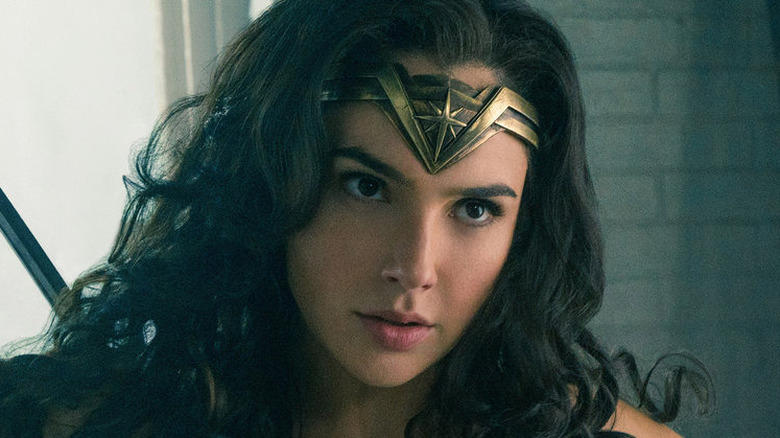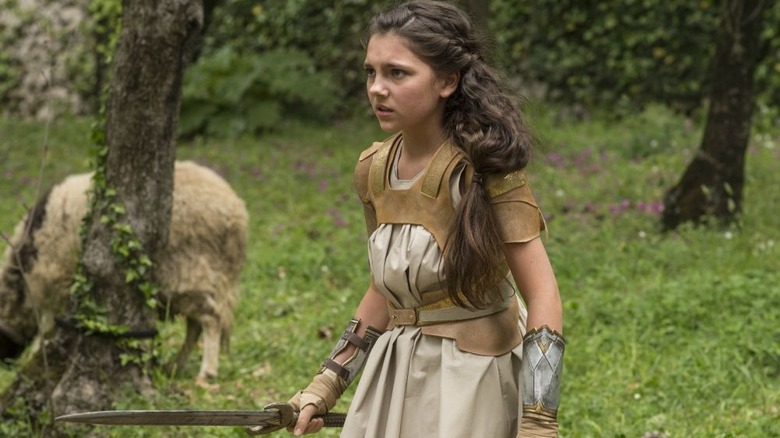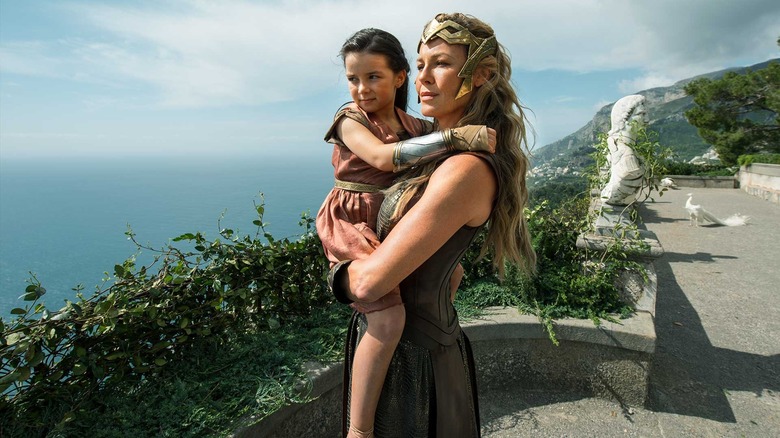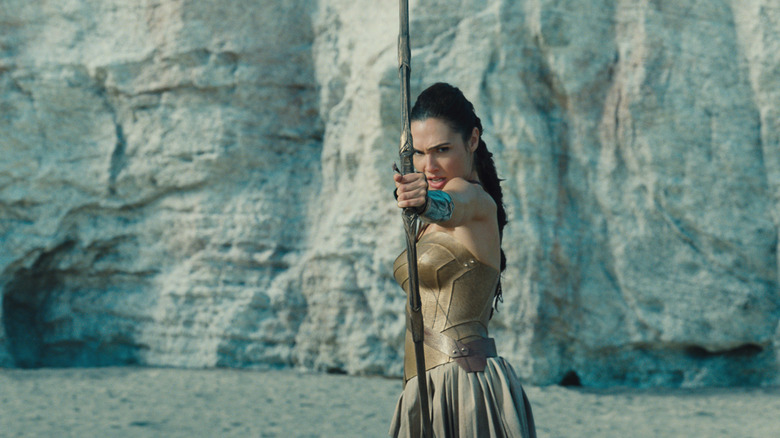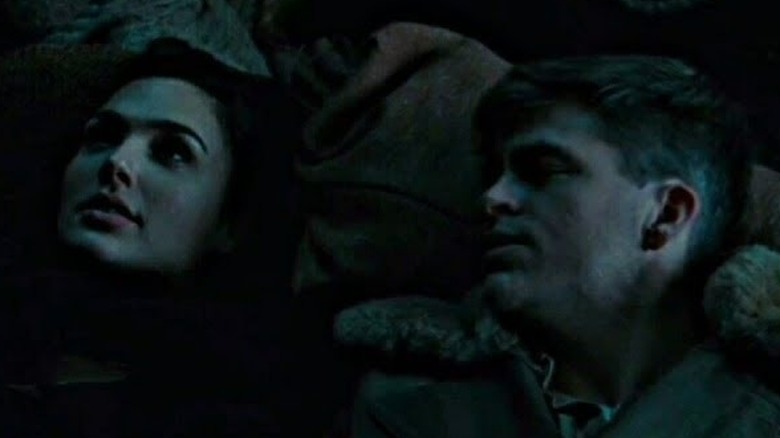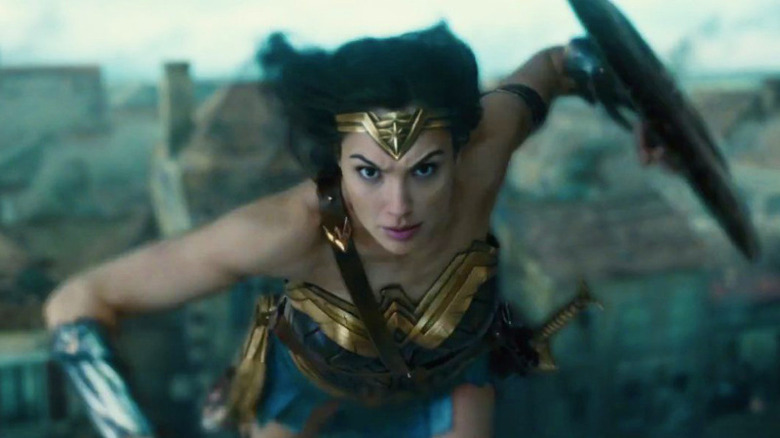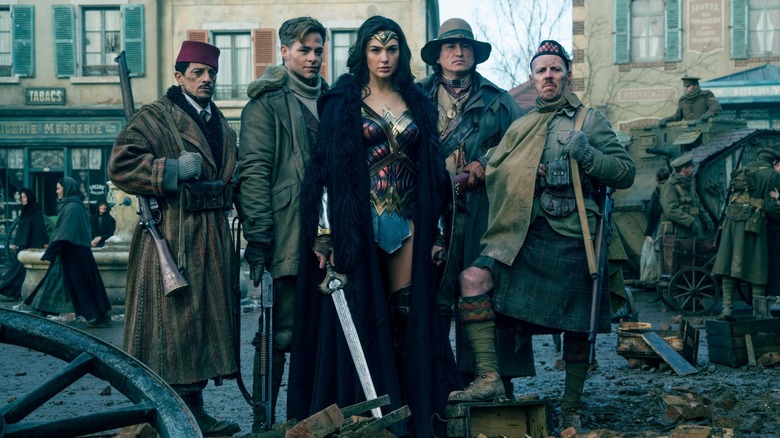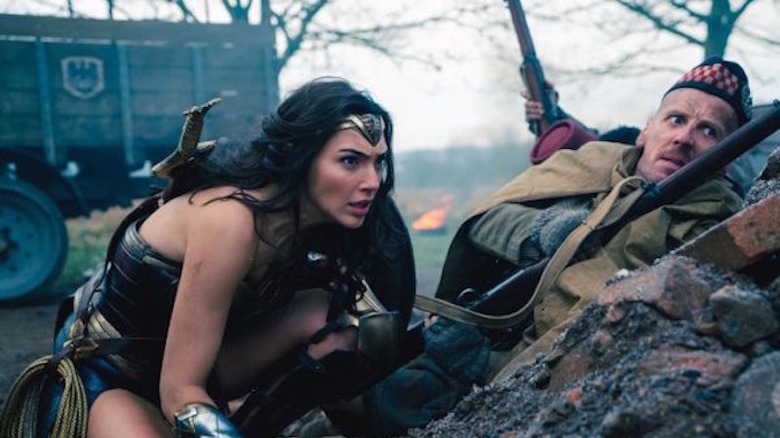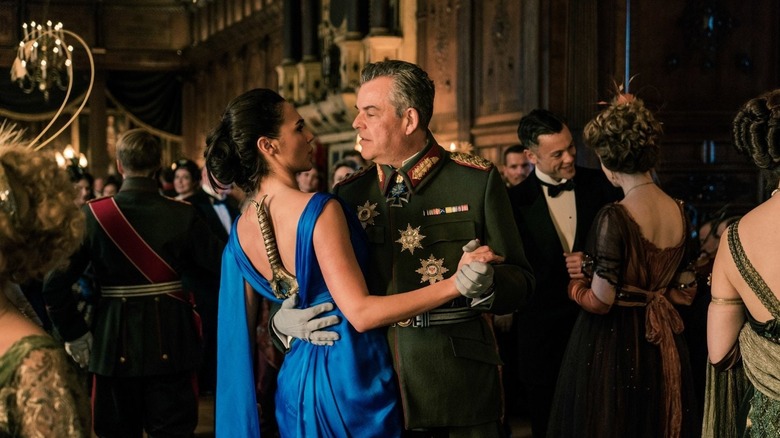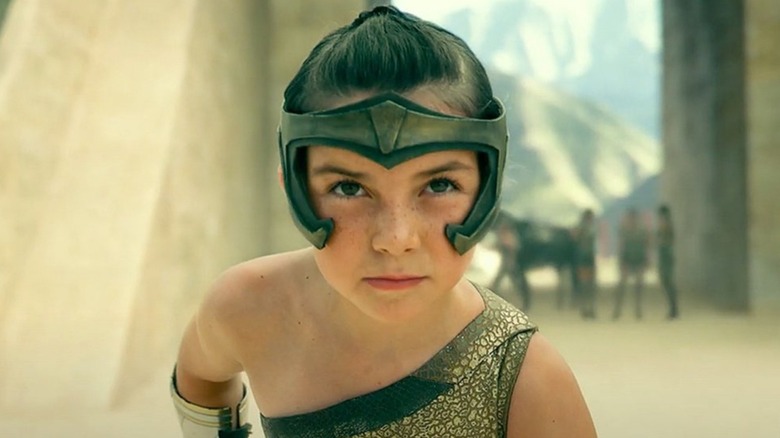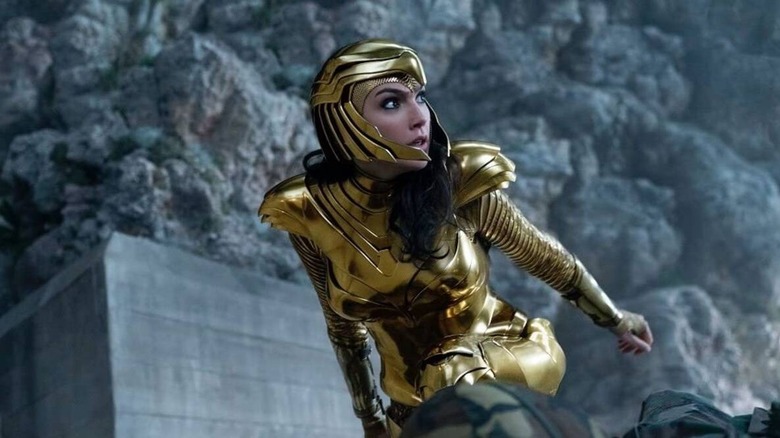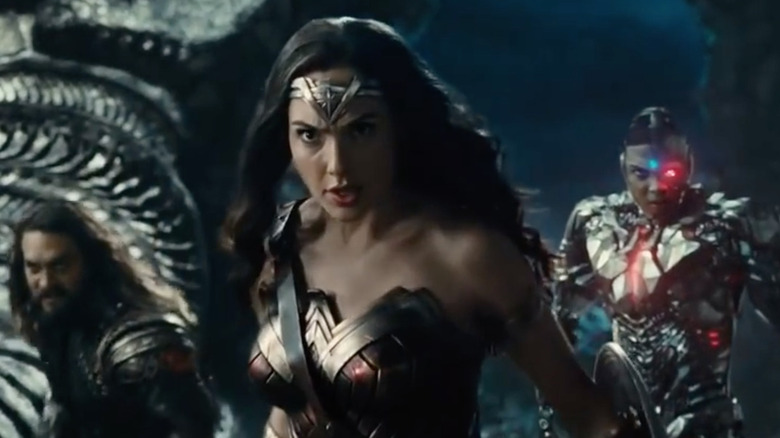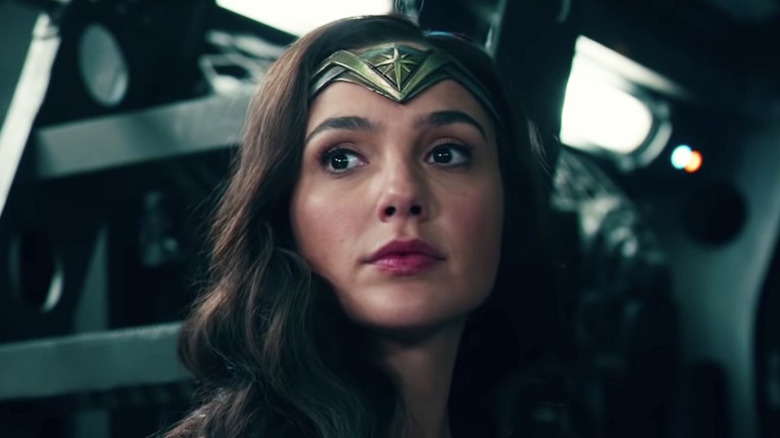Most Memorable Wonder Woman Quotes In The DCEU
First appearing in print in 1941, the character of Wonder Woman was created by psychologist William Moulton Marston — inventor of the lie detector test — to instill feminist ideals into the children of America. While Diana's explicit feminist messaging began to languish in the 1950s and 1960s following Moulton Marston's death, her feminist cred was once again revived when she graced the inaugural cover of Ms. Magazine in 1972. Then, in 1975, the Wonder Woman tv series starring Lynda Carter premiered.
But it wasn't until 2017, more than 75 years after she was first created, that a Wonder Woman feature film was released. The film, starring Gal Gadot and directed by Patty Jenkins, follows Wonder Woman's origin story as she leaves her Amazonian island of Themyscira to help Steve Trevor fight the war. First introduced in 2016's "Batman v Superman: Dawn of Justice," Gadot's Wonder Woman combines elements from Moulton Marston's original comics with newer iterations of the story. With a sequel that came out in 2020 — and a third one on the way – this modern-day Wonder Woman has quickly become a cultural icon once again. If you've somehow missed these films, or if you just need a refresher on what makes them so iconic, we've got you. Read on to find out the most memorable Wonder Woman quotes in the DCEU.
The Amazons believe in Diana
Arguably the most important sequence in 2017's "Wonder Woman" is the first act of the film, when we get to see Diana's childhood on Themyscira. As the only child on the island, Diana simultaneously has tons of freedom and also a huge amount of responsibility, owing to the fact that her mother is none other than Queen Hippolyta (Connie Nielsen) herself. Her aunt, Antiope (Robin Wright), is a general and is known as the greatest warrior Themiscrya has ever seen.
Though Queen Hippolyta has forbidden it, Antiope begins training Diana in secret, knowing she will need to know how to fight in the years to come. When Diana becomes discouraged after falling down, Antiope reminds Diana of one thing: "You are stronger than you believe. You have greater powers than you know." While this quote is quite literal in Diana's case — at this point she doesn't know she's a demigod – it's also an inspiring piece of advice about self-worth and a great example of the ethos of empowerment that has always been a part of Wonder Woman's story.
The theme of this quote is echoed once again in a flashback scene from "Wonder Woman 1984." After Diana loses in the Amazon games as a young girl, she is once again discouraged. This time, it's Hippolyta who reassures her, telling her that "this world is not yet ready for all that you will do." Once more, Hippolyta knows more about Diana's future than she's letting on in this instance, but it's another quote that illustrates the importance of growth and patience when it comes to empowerment.
Diana learns the truth about being a hero
Diana's powerful aunt, Antiope, has a lot to teach Diana about being a hero. Though the Amazons are known as fierce warriors, part of their ideology is that fighting should only be the last resort. As Hippolyta tesla young Diana, the Amazons fought for peace, and they will do everything they can to maintain that peace.
When Diana begs her mother to learn how to fight, Hippolyta refuses to give in to Diana's pleas. "Fighting does not make you a hero," she tells her. Though this piece of wisdom goes in one ear and out the other at the time, it's probably the most important piece of advice Hippolyta gives Diana, and it's something she will learn herself later in the film. While Diana is obviously very powerful — arguably the most powerful person on earth, in this universe — that is not what makes her a hero. Her heroism lies in her kindness, and her empathy, something she eventually learns on her own, many years after Hippolyta tries to teach her this lesson.
Diana thinks she can save the world on her own
Early on in "Wonder Woman," one of Diana's biggest flaws is her naivete and her belief that she can save the world all on her own. While there are certainly many things she can do on her own, what she has yet to learn is the fact that she needs other people — not only their support, but their wisdom, and their humanity — in order to truly "save" the world.
When Diana hears there's a war raging in the human world, she decides she must go and stop the war, believing that it is Ares himself who is making humans do all of these awful things. She will later learn this is not the case, but at the start of the film, she believes this wholeheartedly. While Diana and Steve are journeying from Themyscira to London, Steve tries to explain to Diana the situation. "This war is—a great big mess. And there's not a whole lot you and I can do about that. We can get back to London and try to get to the men who can."
Diana, of course, does not accept this as an explanation. "I'm the man who can," she replies. Though Diana certainly does not understand the situation fully at this point, it's still a wonderfully effective line that, in a way, reduces the entire ideology of Wonder Woman down to a single sentence. Even though she doesn't quite understand what's happening, we'd still follow her into battle.
Diana reveals what the Amazons really think about men
Some of the most humorous parts of "Wonder Woman" are the initial conversations between Diana and Steve. Diana has never seen or spoken to a man before, and Steve, of course, has never been to a place like Themyscira. This leads to some amusing miscommunications, such as the moment Diana points at naked Steve and asks, "what is that?" (Referring to his watch, of course.)
While on their boat journey back to London, Diana and Steve continue their amusing conversations. When Diana reveals that she was "sculpted from clay" and "brought to life by Zeus," Steve replies that babies are made a little bit differently where he comes from. This leads them into a discussion about, as Diana puts it, "the pleasures of the flesh."
Steve is surprised Diana knows about such things, and Diana responds that she has read "all twelve volumes of Clio's Treatises on Bodily Pleasure." Steve is understandably interested, but Diana dissuades him. "They came to the conclusion that men are essential for procreation, but when it comes to pleasure... unnecessary," she tells him. While this line certainly begs the question of what the Amazons actually do up there on Themyscira, it also reveals that Diana already knows that she doesn't need Steve – for pleasure, or anything else. This means that when they do actually get together, it's only because she actually wants to and not because of any societal pressures a non-Amazonian woman might feel. While Steve doesn't get to read Clio's Treatises, we sure would like to. Diana?
Diana learns that humanity is not so black and white
"Wonder Woman" starts and ends with a voice-over from Diana as she sits in her office in modern-day Paris. From this monologue, we learn how Diana used to see the world, and how she sees it now as a result of the events depicted in the film. At the beginning of the film, she tells us: "I used to want to save the world. To end war and bring peace to mankind; but then I glimpsed the darkness that lives within their light. I learnt that inside every one of them there will always be both. The choice each must make for themselves—something no hero will ever defeat."
Growing up in the sheltered world of Themyscira, Diana believed that all humans were fundamentally good. That is why when Steve tells her about the war, the only explanation she can come up with is that it must be Ares' doing. What she comes to learn, however, is that not all humans are good, because every individual has the capacity to make their own choices, and they don't always make the right ones.
Thus, what Diana learns is that the world — and all of humanity — is very flawed. That doesn't mean it's not worth fighting for, though. Continuing her monologue at the end of the film, Diana reflects: "Now I know that only love can truly save the world. So I stay, I fight, and I give, for the world I know can be." What Diana comes to realize is that the world is worth fighting for not because it's perfect, but rather the opposite — because it's wildly imperfect.
Sameer teaches Diana about humanity
There are several moments in "Wonder Woman" where Diana learns about how imperfect the world really is. One such moment is a conversation between Diana and Sameer, one of the soldiers Steve has hired to carry out their mission. Diana and Sameer are discussing what Diana sees as the many contradictions of their team – a sharpshooter who can't shoot, and a smuggler who isn't really in it for the money. Sameer tells Diana the struggles of his own life. "Not everyone gets to be who they want to be all the time. Me, I wanted to be an actor, not a soldier. But I'm the wrong color."
This moment teaches Diana something essential about the world – that it's not fair, and that humans aren't all as kind and honest as she once thought. Sameer teaches Diana one of the most important lessons she will learn on her journey: "Everyone's fighting their own battles, Diana. Just as you are fighting yours." It's at this moment that Diana begins to understand how complicated human beings are, and how everyone is on their own journey to empowerment — not just Wonder Woman herself.
Diana's special moment with Charlie
Following her illuminating conversation with Sameer, Diana has a renewed understanding of humanity – both their great capacity for joy and for pain. As Hippolyta told her many years before, "fighting doesn't make you a hero." There is one moment in "Wonder Woman" that, perhaps more than any other scene, truly exemplifies what about Diana makes her a hero.
When Charlie — who, because of his PTSD, can no longer shoot — questions whether the team would be better off without him, Diana is quick to shut down his self-loathing. "No, Charlie, who will sing for us?" she responds. At this, Charlie gets a huge grin on his face, and the team then spends the evening listening to Charlie sing and play piano while they celebrate in the town square.
This moment illustrates the small ways that Diana is a hero, which, in some sense, are more important than even her superpowers. Diana's real power, we see here, lies in the deep empathy she has for other people. Though she certainly has a great capacity to inspire others through her mighty physical prowess, her superpowers would be wasted did she not also have the capability to feel for and connect with humanity itself. This quiet scene with Charlie shows us that it's not the fighting that makes a hero, but instead, the feeling.
Diana asserts her independence with Steve
We see time and time again in "Wonder Woman" that Diana does not like to be told what to do. While this was certainly a quality she possessed while living on Themyscira, her self-righteous attitude only increases once she leaves the island, especially since she knows she is more powerful than everyone around her. While her attitude is an example of the feminist ideology that runs through the source text, there's also a lot she has yet to learn in the first half of the film.
Nonetheless, it's always thrilling to see Diana refuse to be held back by expectations or by any sort of social codes that may exist. As Connie Nielsen (Hippolyta) has said, one of the things that makes Wonder Woman so extraordinary is that she doesn't understand sexism and hasn't internalized the social rules that so often hold women back, which in turn makes these rules seem ridiculous.
When Steve tries to dissuade Diana from killing Ludendorf, who she thinks is Ares, Diana tells him "what I do is not up to you." Though Steve was right in the end – Lundendorf was not Ares, and killing him doesn't accomplish anything — the things Diana learns are lessons she needs to learn by herself, and her path must be her own. If she let others dictate the decisions she made she wouldn't be Wonder Woman.
Diana learns the importance of truth
Much of "Wonder Woman 1984," the sequel to the 2017 film, is about the importance of truth. As in the first film in the series, "Wonder Woman 1984" begins with a flashback to Diana's childhood on Themyscira. Diana has entered the Amazon Games alongside warriors much older and more seasoned than she. When she tries to win by taking a shortcut, she is disqualified. When Diana protests, Antiope gives her a trenchant piece of advice that will feature heavily in the rest of the movie. "No true hero is born from lies," she tells her.
Later in the film, we meet Barbara Minerva, AKA Cheetah, who will become one of Wonder Woman's nemeses. Barbara looks up to Diana, so she wishes on Maxwell Lord's Dreamstone to become just like Diana, which grants her the powers of an Amazon. Later, when she is granted another wish, she wishes to become a hunter with extraordinary powers, which turns her into the Cheetah we all know.
Diana, of course, has empathy for Cheetah, and, instead of fighting her, urges her to renounce her wish. "Nothing good is born from lies, Barbara," Dianna tells her, echoing Antiope's words from earlier in the film. While Cheetah is, unfortunately, a rather thinly drawn villain, this moment clearly emphasizes the central theme of the film, which is about accepting truth rather than living in a fantasy. For Barbara, who clearly wants to be someone else, this lesson is especially prescient.
Diana frees humanity from Maxwell Lord
Though Cheetah is one of the main antagonists in "Wonder Woman 1984," Maxwell Lord is the villain that propels most of the story forward. In the film, Lord is an oil tycoon who acquires a magical object called the Dreamstone, which grants those who possess it their wishes. When Lord wishes to literally become the Dreamstone, he then gains the ability to grant other people's wishes himself.
Inevitably, this has terrible consequences and reshapes the very fabric of reality. Having the power of the Dreamstone means Lord basically controls the desires of others, and inevitably, the contradictory nature of people's wishes creates a huge amount of chaos (and some pretty big paradoxes, which the film itself doesn't really touch upon). Moreover, being granted a wish always has a cost, and for Diana, that means she loses her powers when she wishes for Steve to return.
When Maxwell Lord gets access to a satellite transmitter, he sends out particles that essentially "touch" everyone in the world, giving him the ability to grant everyone's wishes. Just before the world is about to totally spin out of control, Diana, speaking through the satellite broadcast, makes a plea with the world to renounce their wishes and restore balance to the universe. "This world was a beautiful place just as it was, and you cannot have it all. You can only have the truth. And the truth is enough. The truth is beautiful." Rather than Diana having the power here, her call to action essentially puts the choice to save the world in the hands of the people rather than the hands of the hero, a rather novel move for a superhero movie.
Diana asserts her power over Steppenwolf
Wonder Woman's third appearance in the DCEU — following "Batman v Superman" and "Wonder Woman" — was in "Justice League," which initially came out in 2017. In 2021, of course, Zack Snyder's re-cut version of the film came out after fans began clamoring for his original vision for the film. In addition to many other changes from the original cut, the Snyder version contains more of our beloved hero, Wonder Woman.
In one powerful scene, Diana is fighting the villain Steppwnolf, who has already killed many of Diana's Amazonian compatriots. Thinking he can defeat Diana because of how well he fought the other Amazons, he sets his sights on vanquishing Wonder Woman once and for all. Proclaiming his belief that he can defeat Diana and his conviction that he alone should be the one to fight her, he declares: "This one will be mine."
The ever-independent Diana responds, "I belong to no one." While the other members of The Justice League aid Diana in her fight against Steppenwolf, as Zack Snyder once put it, "I use Gods to kill Gods." After Superman and Aquaman deal some vicious blows to Steppenwolf, it's Diana who finishes the job, brutally slicing his head off with a sword. It's a fitting achievement for a character that many thought was mistreated in the original Joss Whedon version of the film, and finally illustrates what we've known all along — Diana is the most powerful of them all.
Diana is a hero in small ways, too
Though Wonder Woman has certainly accomplished many heroic acts during her long life, sometimes the most meaningful moments are the quiet ones. During one scene in "Zack Snyder's Justice League," Diana saves a group of hostages from an explosion. After defeating the terrorists, Diana checks to make sure the hostages are alright, honing in on one little girl. "Are you okay, princess?" she asks.
Rather than responding in the affirmative, the girl replies "Can I be like you someday?" "You can be anything you want to be," Diana responds. Not only is this a sweet moment in an otherwise action-packed film, but it also exemplifies the real-world implications of Wonder Woman as a character. Per William Moulton Marston's original conception of her, Wonder Woman has always been seen as a feminist hero, and someone young people can look up to and be inspired by.
This has certainly been the case with this modern-day version of Wonder Woman, as moments like this one, where Gadot comforts a young girl crying at Comic-Con, have become emblematic of the cultural importance of the character. It's a fairly simplistic message, but one that has hit home with fans of the hero, both young and old.
